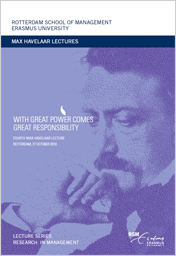With Great Power Comes Great Responsibility
Max Havelaar Lecture 2010
 The Max Havelaar Lecture 2010 is entitled ‘With great power comes great responsibility,’ as companies are increasingly expected to use their substantial powers to do good.
The Max Havelaar Lecture 2010 is entitled ‘With great power comes great responsibility,’ as companies are increasingly expected to use their substantial powers to do good.
History has shown that trade can cause large-scale disaster to people, animals and the planet. Fortunately, history also increasingly shows the good effects of trade. With the right attitude and resources, trade can contribute to alleviating poverty and sustainable development of developing countries. However, both civilians and authorities are understandably suspicious of the significant power of companies. This results in an unyielding ‘low-trust’ society that achieves less progress than would be desirable and feasible.
This fourth Max Havelaar lecture expands on how the power of companies can be wielded as a positive contributor to key themes such as human rights, combating poverty and sustainable development. The lecture also discusses the issue if it would be better for companies to contribute at their own initiative, or in collaboration with other parties, and the basic requirements for each. In accordance with the lecture’s tradition, this theme will be discussed from various perspectives.
Table of Contents
About Rotterdam School of Management, Erasmus University
About the Partnerships Resource Centre
About the Max Havelaar Foundation
About the Max Havelaar Lecture
Introductions
The Power of Simplicity by Peter d’Angremond
The Power of Finance by Koert Jansen
Position paper
With Great Power comes Great Responsibilty by Rob van Tulder
The Power of Management Sciences by George Yip
The Corporate Perspective by Sjaak de Korte (Plus supermarkets)
The Non-profit Perspective by Rob Cameron (CEO Fair Trade International)
The Civil Society Perspective by Joan Karanja (Cooperation for Fair Trade in Africa)
The Government Perspective by Jan Pronk (former Dutch minister and vice-president of Unctad)
Personalia


